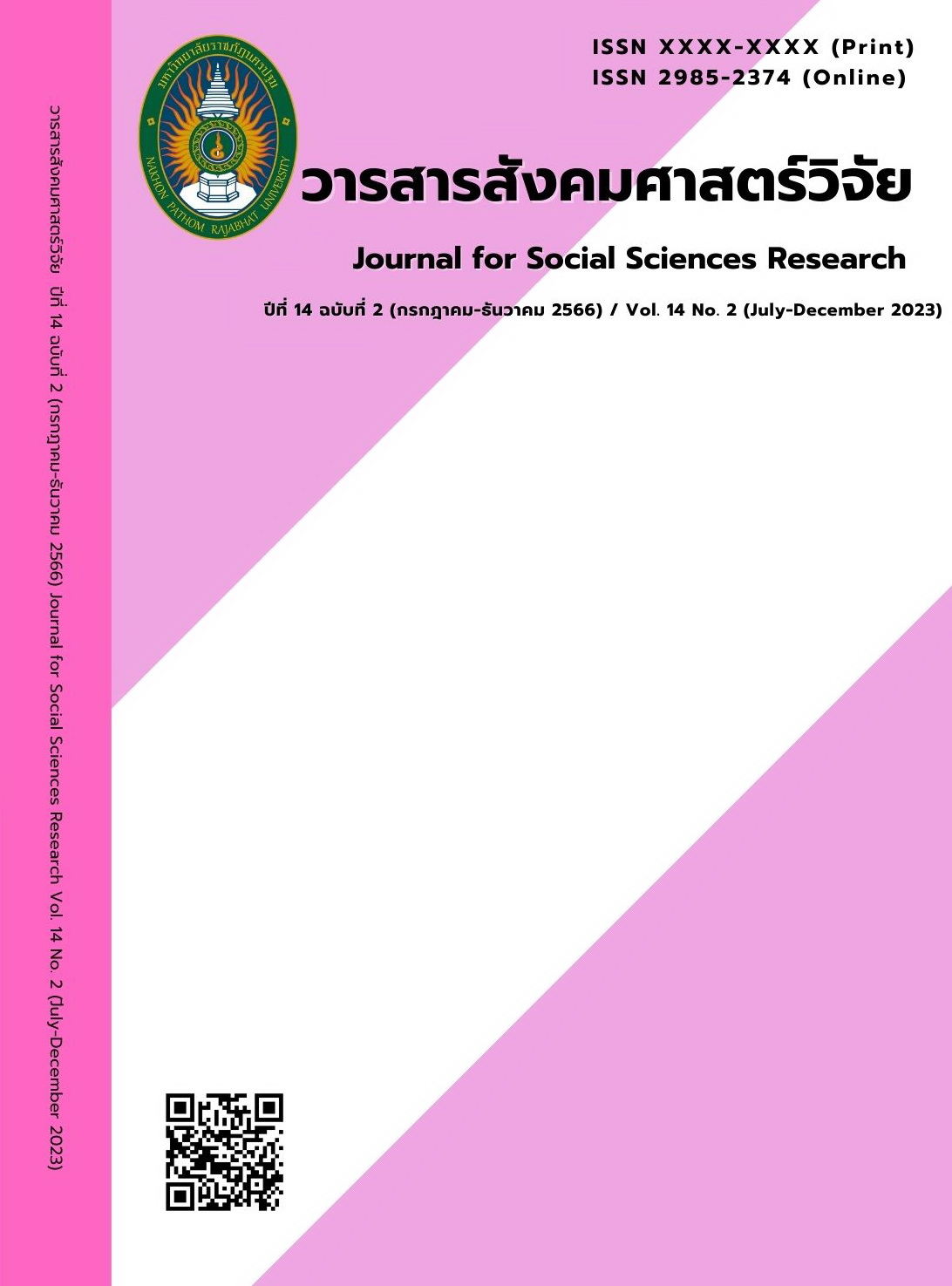ADVERSITY QUOTIENT, EMOTIONAL INTELLIGENCE AND ADJUSTMENT OF EMPLOYEES OF NGERN TID LOR HEAD OFFICE, BANGKOK
Main Article Content
Abstract
The purposes of this research were to: 1) study the level of adversity quotient; emotional intelligence, and adjustment of employees of Ngern Tid Lor Head Office; 2) compare the adjustment of employees as classified by personal factors; 3) study the relationship between adversity quotient and adjustment of employees; and 4) study the relationship between emotional intelligence and adjustment of employees. The sample was 240 employees of Ngern Tid Lor Company, Head Office, Bangkok. The research instrument was a questionnaire. The statistics used for data analysis were percentage, mean, standard deviation, t-test, one-way ANOVA and Pearson’s product-moment correlation coefficient.
The results showed that: 1) Adversity quotient and adjustment of employees were at a high level, while emotional intelligence was at a moderate level. 2) The employees with different personal factors were not different in the adjustment. 3) Adversity quotient was positively related to the adjustment of employees with statistical significance at .05 level. 4) Emotional intelligence was positively related to the adjustment of employees with the statistical significance at .05 level.
Article Details

This work is licensed under a Creative Commons Attribution-NonCommercial-NoDerivatives 4.0 International License.
บทความที่ได้รับการตีพิมพ์เป็นลิขสิทธิ์ของมหาวิทยาลัยราชภัฏนครปฐม
เนื้อหาของแต่ละบทความเป็นทัศนะของผู้เขียน ซึ่งที่ปรึกษา บรรณาธิการ กองบรรณาธิการ และคณะกรรมการบริหารวารสารไม่จำเป็นต้องเห็นด้วย หรือร่วมรับผิดชอบใดๆ
References
กรมสุขภาพจิต กระทรวงสาธารณสุข. (2543). แบบประเมินความฉลาดทางอารมณ์. ค้นเมื่อ 27 ธันวาคม 2565, จาก https://goo.by/y6dJU
กฤษณีย์ โหมดทอง, ประสงค์ ตันพิชัย และระวี สัจจโสภณ. (2562). ปัจจัยที่มีผลต่อความสามารถในการเผชิญและฟันฝ่าอุปสรรคของนิสิตมหาวิทยาลัยเกษตรศาสตร์ วิทยาเขตกำแพงแสน จังหวัดนครปฐม. วารสารสังคมศาสตร์วิจัย, 10 (2), 18-33.
ทิพย์ประภา พิศาลกิตติคุณ. (2558). ความฉลาดทางอารมณ์ที่มีผลต่อประสิทธิภาพการปฏิบัติงาน: กรณีศึกษา ผู้ปฏิบัติงานฝ่ายควบคุมระบบกำลังไฟฟ้า การไฟฟ้าฝ่ายผลิตแห่งประเทศไทย. วิทยานิพนธ์รัฐประศาสนศาสตรมหาบัณฑิต สาขาวิชารัฐประศาสนศาสตร์ บัณฑิตวิทยาลัย มหาวิทยาลัยศิลปากร.
ธัญญารัตน์ ยุวรรณะ และพวงเพชร์ วัชรอยู่. (2557). อิทธิพลของการเผชิญและฟันฝ่าอุปสรรค และการเห็นคุณค่าในตนเองต่อความผาสุกของพนักงานฝ่ายผลิตในบริษัทผลิตบรรจุภัณฑ์แห่งหนึ่ง. วารสารสังคมศาสตร์และมนุษยศาสตร์, 40 (1), 147-165.
นิดา แซ่ตั้ง. (2555). ความฉลาดทางอารมณ์และความฉลาดในการเผชิญอุปสรรคที่มีผลต่อการทำงานของพนักงานธนาคารพาณิชย์ในกรุงเทพมหานคร. สารนิพนธ์บริหารธุรกิจมหาบัณฑิต สาขาวิชาการจัดการ บัณฑิตวิทยาลัย มหาวิทยาลัยศรีนครินทรวิโรฒ.
บริษัทเงินติดล้อ จํากัด (มหาชน). (2563). เปิดแผน BCP ฝ่าวิกฤตโควิด-19. ค้นเมื่อ 18 ธันวาคม 2565, จาก https://www.tidlor.com/th/tidlorstory/corporate/bcp-covid
บริษัทเงินติดล้อ จํากัด (มหาชน). (2565). ข้อมูลทั่วไป. ค้นเมื่อ 19 ธันวาคม 2565, จาก https://www.tidlorinvestor.com/th/corporate-information/general-information
ปริวันท์ ลำพูล. (2558). ความสามารถในการเผชิญปัญหาและฟันฝ่าอุปสรรค ความเหนื่อยหน่ายในงาน และผลการปฎิบัติงานของพนักงานวิศวกร บริษัทอสังหารมิทรัพย์แห่งหนึ่ง. วิทยานิพนธ์ศิลปศาสตรมหาบัณฑิต สาขาวิชาจิตวิทยา อุตสาหกรรมและองค์กร บัณฑิตวิทยาลัย มหาวิทยาลัยธรรมศาสตร์.
พรรณฑิตา ทัศนิยม และชนัดดา เพ็ชรประยูร. (2564). ความสัมพันธ์ระหว่างการปรับตัวในการทำงานและความตั้งใจคงอยู่ในงานของพนักงานระดับหัวหน้างานในธุรกิจบรรจุภัณฑ์. วารสารจิตวิทยา, 19 (1), 16-27.
พรรัตน์ แสดงหาญ. (2563). การปรับตัวในการทำงานที่บ้านของผู้ปฏิบัติงานในเขตพัฒนาพิเศษภาคตะวันออกในช่วงวิกฤตโควิด-19. วารสารการจัดการธุรกิจ มหาวิทยาลัยบูรพา, 9 (2), 14-33.
พันธนีย์ ธิติชัย และภันทิลา ทวีวิกยการ. (2564). รายงานผลการทบทวน สถานการณ์โรคโควิด-19 และมาตรการควบคุมป้องกันในระดับโลก และในประเทศไทย. กองระบาดวิทยา กรมควบคุมโรค. ค้นเมื่อ 24 ธันวาคม 2565, จาก http://www.thaincd.com/document/file/download/knowledge/COVID19.65.pdf
วีระวัฒน์ ปันนิตามัย. (2551). เชาวน์อารมณ์ (Emotional quotient—EQ): ดัชนีวัดความสุขและความสำเร็จของชีวิต (พิมพ์ครั้งที่ 7). กรุงเทพฯ: สำนักพิมพ์จุฬาลงกรณ์มหาวิทยาลัย.
Best, J. W. & Kahn, J. V. (2016). Research in education (10th ed.). London: Pearson.
Bujang, M. A., Omar, E. D. & Baharum, N. A. (2018). A review on sample size determination for Cronbach’s alpha test: A simple guide for researchers. The Malaysian Journal of Medical Sciences, 25 (6), 85-99.
Johnson, M. (2023). Optimism, adversity, and performance: Comparing explanatory style and AQ. Master of Arts in Psychology Graduation, San Jose State University.
Maharani, D. M. (2022). Pengaruh adversity quotient dan quality of work life terhadap kinerja karyawan ud.sumber makmur. Master of Arts in Psychology, Undergraduate Universitas Muhammadiyah Malang.
Nicholson, N. & West, M. (1988). Managerial job change: Men and women in transition. Cambridge: Cambridge University Press.
Roy, C., Pollock, S. E. & Massey, V. H. (1999). Roy adaptation model-based research: 25 years of contributions to nursing science. Sigma: Sigma Theta Tau Intl.
Safi’i, A. et al. (2021). The effect of the adversity quotient on student performance, student learning autonomy and student achievement in the COVID-19 pandemic era: Evidence from Indonesia. Heliyon, 7 (12), 1-8.
Salovey, P. & Mayer, J. D. (1990). Emotional intelligence. Imagination, Cognition and Personality, 9 (3), 185-211.
Soysub, A. & Jarinto, K. (2018). The effects of multiple intelligent (IQ, EQ, and AQ) on employee performance: A case of ABC Automotive Co., Ltd. RMUTT Global Business Accounting and Finance Review, 2 (1), 1-12.
Stoltz, P. G. (1999). Adversity quotient: Turning obstacles into opportunities. New Jersey: Wiley.
Yamane, T. (1967). Statistics: An introductory analysis (2nd ed.). San Francisco: Harper & Row.


